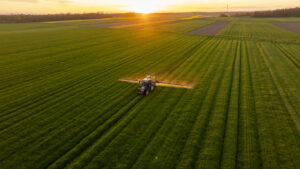Written by Gilly Kinsky, VP Marketing, CropX
The Industry Reality Check
Online marketplaces, direct sales, dealers willing to drive three counties over for a deal. Farmers can buy equipment anywhere now. The barriers to switching dealers have never been lower.
But farmers can’t buy real partnerships anywhere. They can’t download wisdom or comparison shop for someone who actually understands their operation.
Listen to what farmers are actually saying about this. Mike Starkey, a 7th-generation farmer from Indiana, cuts straight to what matters: “If something goes down and it’s something I can’t figure out, I want somebody to fix it, and I want them to fix it fast… I didn’t have the patience to wait the whole day for something that could’ve been fixed in an hour. That’s number one.”
But Starkey doesn’t stop there. He explains what creates lasting farmer relationships: “Having a demo of some sort, I know that’s quite a bit of an investment, that would be the icing on the cake.”
The Long Game Mindset
Loran Steinlage, an innovative farmer from Iowa, puts it even more bluntly: “Play the long game would be the best advice I’d leave you with. If you’re in it to make that quick buck, it’s not going to last. If your customer is in it for that quick buck, it’s not going to last. It’s that relationship that you have to foster and build. It’s that simple.”
This is the fundamental shift. The dealers winning today figured out that their success is directly tied to their farmers’ success. Not just this season, but year after year, through good markets and bad.
The farmers who work with these dealers aren’t just buying equipment. They’re buying someone who thinks about their operation like they do.
What Partnership Actually Looks Like
1) Start With Proof, Not Promises
Farmers today want evidence, not sales pitches. As Mike Starkey explains: “I’m a numbers man. I like to do my own on-farm research. If there’s a new product… I want to actually have on-farm research that proves its worth. How much did my yield increase to pay for the product?”
Smart dealers have adapted. Instead of leading with features, they lead with results. They can show how their recommendation increased yields by 12 bushels per acre or saved $30 per acre in inputs. They speak in profit per acre, not horsepower.
2) Get It Right From Day One
Loran Steinlage knows what separates good dealers from great ones: “A properly run demo. Get a new product in the farmer’s hands and have the knowledge there to teach them how to use it from day one… Send out your best tech with that piece of equipment and have it set up to optimize performance from day one.”
This is where the opportunity lies. While traditional approaches focus on closing the sale, partnership approaches focus on ensuring farmer success with their purchase. The real relationship-building work starts after the handshake.
3) Think Beyond the Transaction
The strongest dealer farmer relationships we see go way beyond equipment sales. These dealers understand cash flow cycles, market pressures, and family dynamics. They time conversations around farming realities, not dealer incentives.
When commodity prices drop overnight, they’re not pushing inventory. They help farmers think through scenarios. When a young farmer wants to come back to the operation, they help figure out if the numbers work for two families.
4) Break Through the Trust Barrier
Here’s something the industry research shows: farmers are naturally skeptical of dealers. They trust other farmers first, dealers second. But this skepticism completely disappears when farmers have strong personal relationships with individual dealers.
In other words, the relationship changes everything. When you invest time in understanding their operation and proving your value over time, that natural skepticism turns into genuine trust.
We’ve watched dealers maintain farmer relationships through equipment brand switches, economic downturns, and even farm ownership transitions to the next generation. What they had in common: they built trust around business outcomes, not product features.
5) Turn Data into Competitive Advantage
Modern farms generate incredible amounts of information, but most farmers struggle to turn that data into profitable decisions. This is where forward-thinking dealers are finding their biggest opportunity.
Instead of just fixing equipment when it breaks, they’re using performance data to optimize entire operations. They spot efficiency opportunities farmers can’t see from inside their own business. They translate technological capabilities into bottom-line results. The farmers working with these dealers aren’t just buying better equipment. They’re buying a competitive advantage.
6) Build Through Education
The best partnerships are built on shared learning. When dealers host workshops, run meaningful demos, and teach farmers how to optimize their operations, they become indispensable resources.
This education approach pays huge dividends when farmers face new challenges. Instead of hunting for answers online or calling competitors, they turn to the dealer who’s already proven they understand the business.
Making the Shift
Moving from vendor thinking to partner thinking starts with a simple change: measure your success by farmer results, not just transaction volume.
Sometimes this means talking a farmer out of a purchase that doesn’t make financial sense. Sometimes it means spending extra time with someone who needs guidance, not just someone ready to buy. Sometimes it means having conversations about topics that seem outside your wheelhouse.
But dealers who make this shift discover something powerful: farmers will pay more to work with someone they genuinely trust. They stay loyal longer. They refer more business. They create the kind of farmer relationships that survive any market condition.
The Future Belongs to Partners
Agriculture is changing faster than ever. New technologies, environmental regulations, market volatility, generational transitions. Farmers are navigating complexity that would challenge any business owner.
They don’t need another vendor to try to sell them something. They need partners who understand their challenges, share their goals, and have the expertise to help them succeed.
The dealers who recognize this aren’t just surviving industry changes. They’re thriving because of them. They’ve built relationships that go deeper than transactions, and that’s becoming the most valuable asset in agriculture.
Equipment wears out. Technology gets replaced. Market conditions change.
But real partnerships? Those are built to last.




